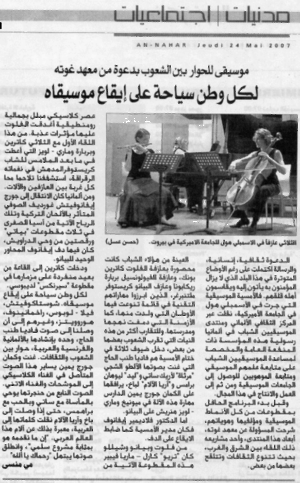A Music Journey through Ages und Cultures
SyriaTimes, culture, 4-7-2007, Dr. Sadek Pharaon
The Goethe Institute in Damascus, in collaboration with the Stiftung Podium of young musicians in Germany, invited music lovers to attend a concert given at the auditorium of the Faculty of Fine Arts under the title of " A Music Journey through Ages and Cultures" by five young German and two Syrian musicians. The German team, led by Dr. Vladimir Invanoff were: Miss K Bonke, flute, Miss M. L. Hinrichs, piano, Miss B Riccabona, cello and Mr. Ch. Miltenberger, piano. Our participants were Mr. Rami Odeh, oboe and Mr. M Nadim Hussny, viola. The 1st work was C M von Weber`s Trio in G minor Op. 63 for cello, flute and piano. This is a wonderful romantic work with emotional intimacy and tender emotions.
The artists gave a fine and impressive interpretation of this poetic work. The 2nd item was R Schumann`s Romance No. 1 for oboe and piano and was also played with tact. Now followed three pieces by the Russian G I Gurdjieff (1866-1949): Bayati and two Dervish Dances for piano and drum. They imitate the old Turkish music with its monotonic and repetitive fixed scales portraying the old intoxicated worlds of somnolence, "narghile" and day-dreaming. The last one was livelier with a euphoric end. Now came Debussy`s Syrinx for solo flute, a wonderful piece from the hero of expressionism. The first part ended with Seven Variations by Beethoven on a theme from Mozart`s Magic Flute, for cello and piano which formed a fine end for the first half of the evening.
In the 2nd part, the piano and oboe played a Bach`s Gavotte and was received with applause. From H Villa-Lobos, the cello and flute played his "Jet Whistle", a fascinating work portraying the hazy world of Latin America and the troubled existence of its aborigine humans whose existence and survival were trembled by the alien invaders! Now Herr Miltenberger played two pieces on the piano: Prelude in G sharp minor by Rachmaninoff and Intermezzo in A by Brahms. After that the viola and piano played an "Elegy" by Solhi Al Wadi that showed the deep human sense of forthcoming tragedy, was excellently played by both artists and was received with high ovation. Now came the colossal Dmitri Shostakovich and the two young ladies played his Sonata for cello and piano in D minor (1944). They were ecstatic moments where the greatest composer during the Stalin era expressed and portrayed, most rhetorically and expressively. His music penetrates the deepest sites of the human soul and can cause a real shiver from that bygone history of human bondage. Bravo. The concert ended by playing B Martinu`s First movement from his Trio for flute, cello and piano (1944). It was a climactic end of this fine and promising concert. The audience gave a high ovation to the participating artists from both Germany and Syria. This music evening had a deep and highly meaningful gesture : that music, Great Music, is probably the best and ablest force that can build bridges of understanding, toleration and humane co-existence among all nations of Earth, irrespective of their cultural and ethnic backgrounds. It can create a real world of peace and friendship amongst all peoples and races of our planet when the megalomaniac sole superpower showed its ferocious Dorian Gray`s face that caused and is continuously still causing all the dreadful tragedies of Humanity during the last half-century. Let there be Music on Earth so that the beastly whims of the carnivores would be remedied. Amen. Dear young musicians coming from Germany Thank you from the heart. Your presence is a proof that Humanity is still healthy, fertile and well. Do come again.

